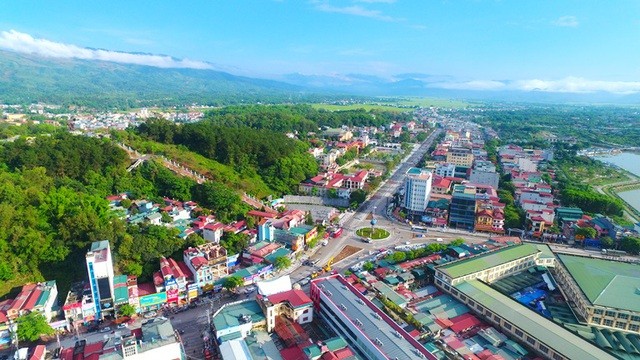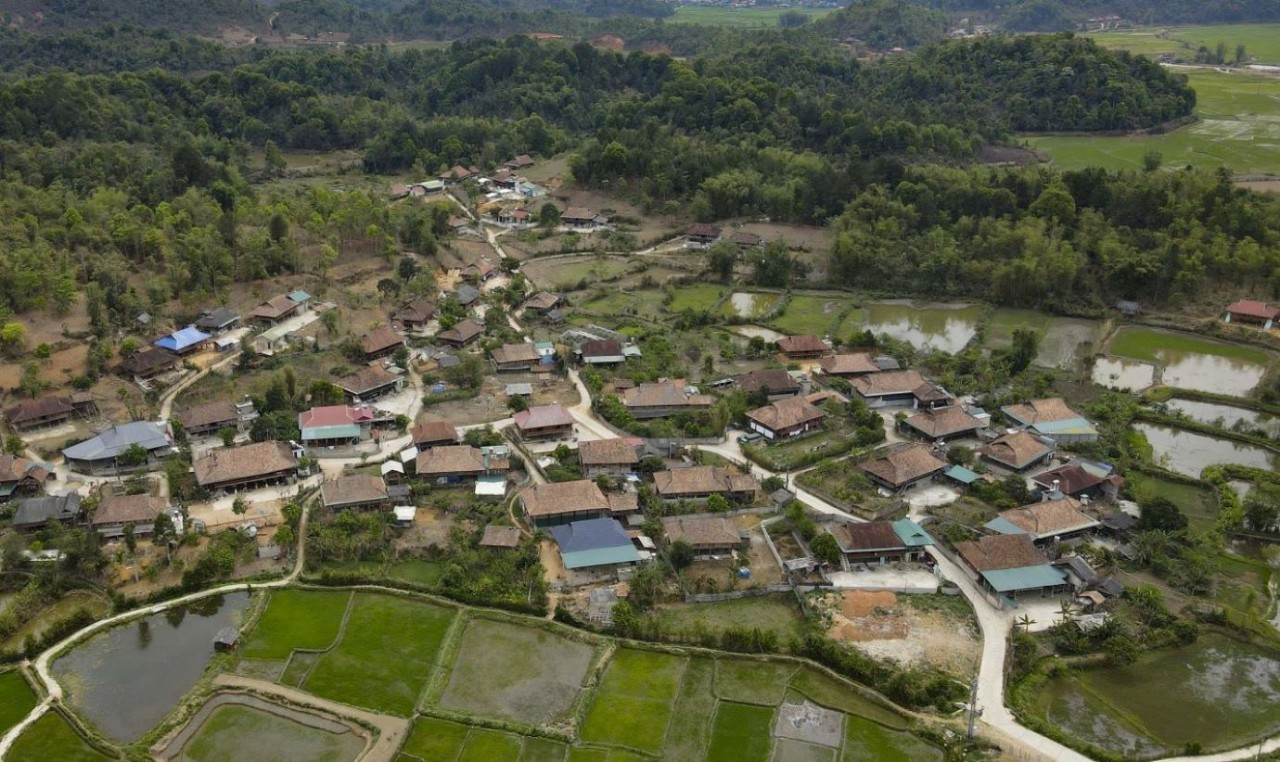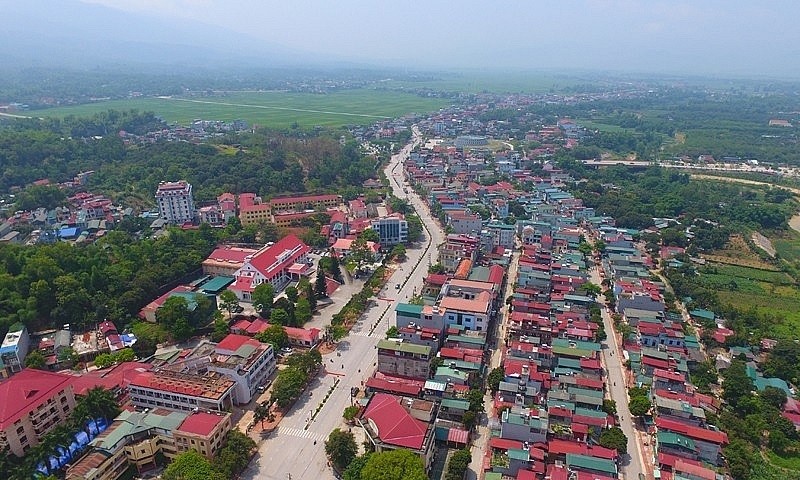
Dien Bien: Changing for the better
Latest
 |
| During the period of 2016 - 2020, Dien Bien’s growth rate reached 6.83% annually, while from 2021 to 2023, it surged to 9.33% per year. (Source: VGP) |
After the 1954 Dien Bien Phu Victory, the lives of the people here have been marked by immense hardship and deprivation on all fronts.
However, the Party, the government, and the people of all ethnic groups in Dien Bien have united steadfastly, striving to advance in economic and social development, ensuring national defense and security, expanding foreign relations, and harnessing potentials and advantages, seizing opportunities, and utilizing all available resources to construct and develop their homeland for the peaceful and prosperous lives of the 19 brotherly ethnic groups.
Increasingly developing economy
During the period of 2016 - 2020, Dien Bien’s growth rate reached 6.83% annually, while from 2021 to 2023, it surged to 9.33% per year. The average income per capita in 2020 was 38.25 million VND per year (equivalent to 1,732.2 USD per person per year), which increased to 48.6 million dong per year by 2023. The economic structure shifted in the right direction, with a gradual reduction in agriculture, forestry, and aquaculture, and an increase in industrial-construction, services, and tourism sectors.
With an increasingly developing economy, the province put a focus on poverty reduction and social welfare. In the past 3 years, more than 8,000 impoverished households have received financial support to eliminate temporary shelters and repair their homes. Settlement and livelihoods have improved, resulting in a decreasing poverty rate each year. Currently, the poverty rate stands at 26.03%, with an average reduction of 4% per year.
According to the Statistics Office of Dien Bien province, the economic growth in the first quarter of 2024 in the province is estimated to reach 6.07% compared to the same period last year, ranking 25th nationwide and 4th in the North Central Mountainous region.
The Gross Regional Domestic Product (GRDP) at current prices in the province reached 6,098.54 billion VND, marking an 11.02% increase compared to the same period last year. Specifically, the agriculture, forestry, and fisheries sector reached 570.25 billion VND, up by 4.9%; the industry and construction sector reached 1,223.04 billion VND, up by 14.02%; the service sector reached 3,983.14 billion VND, up by 11.08%; and the product tax minus subsidy reached 322.06 billion VND, up by 10.68%.
In terms of economic structure in the first quarter of 2024, the agriculture, forestry, and fisheries sector accounted for 9.35%; the industry and construction sector accounted for 20.05%; the service sector accounted for 65.31%; and the product tax minus subsidy accounted for 5.28%.
The Dien Bien Airport, a strength of the province, is considered a crucial link on the investment map for both domestic and foreign investors in the Northwest region. By 2025, it is expected that the airport will contribute significantly, helping to mobilize approximately 15,000 billion VND in total social investment capital, increase local budget revenue by at least 170 billion VND, and directly create jobs for about 8,000 workers.
 |
| Along with that, Dien Bien has engaged in investment promotion adjacent to enforcement of plans to develop its socio-economy. (Photo: TTXVN) |
In the past time, Dien Bien has sychronously implemented various measures to attract investments both inside and outside the province, with a focus on reviewing and prioritizing sectors with potential and strengths such as: high-tech agricultural production, organic agriculture, processing industry, supporting industries, clean energy, renewable energy, and investment in urban infrastructure development.
Along with that, Dien Bien has engaged in investment promotion adjacent to enforcement of plans to develop its socio-economy. Dien Bien has actively promoting, and attracting leading national corporations and companies to explore, survey, research, sign cooperation agreements, and implement large-scale investment projects. Notable among these are Sun Group, Vin Group, Deo Ca Group, and Onew JSC., among others.
Additionally, the province also organized regular meetings with business associations and investors in the vicinity to review the implementation of projects and ddress any existing challenges and obstacles falling within the responsibility of state agencies. There is a focused effort on constructing and efficiently implementing the Provincial Competitiveness Index (PCI) Enhancement Program to continue attracting investment, with the expectation of surpassing the number of projects and total registered investment capital of the previous year.
Especially this year, the province is welcoming National Tourism Year - Dien Bien 2024, commemorating the 70th anniversary of the Dien Bien Phu Victory, with an estimated arrival of 1.3 million visitors and projected revenue of 2,200 billion VND. This presents a significant opportunity to boost socio-economic development and create employment opportunities for many local workers.
 |
| Dien Bien Phu city. (Photo: VNA) |
Transforming Dien Bien into a moderately developed province
Recently, Deputy Prime Minister Tran Hong Ha signed Decision no.109/QD-TTg of the Prime Minister, approving the Master Plan for Dien Bien Province for the period 2021 - 2030, with a vision towards 2050.
The planning scope covers the entire natural area of Dien Bien Province, with an approximate scale of 9,539.92 square kilometers, consisting of 10 administrative units: Dien Bien Phu City, Muong Lay Town, Muong Nhe District, Muong Cha District, Tua Chua District, Tuan Giao District, Muong Ang District, Dien Bien District, Dien Bien Đong District, and Nam Po District.
The general objective by 2030 is for Dien Bien to become a moderately developed province in the North Central and Northern Mountainous regions, serving as one of the key tourism, service, and healthcare centers in the area. The province aims to develop agriculture, forestry, and fisheries with the application of modern science and technology, ensuring high productivity and quality, combined with processing industries, tourism, and the digital economy playing crucial roles in its development. The focus is on developing a synchronized and modern economic and social infrastructure system. Stability in politics, national defense, security, and maintaining border sovereignty are also key objectives.
Specific targets by 2030 include achieving an annual economic growth rate of 10.51% for the period of 2021-2030, with the economic structure composed of approximately 41.2% from the service sector, 12.7% from agriculture, forestry, and fisheries, and about 42.4% from the industry and construction sector (of which industry accounts for about 12.1%). By 2030, the average GRDP per capita is targeted to exceed 113 million dong (at current prices), labor productivity to reach 190.0 million dong (at current prices), and the multidimensional poverty rate to decrease to below 8%.
Tourism development is aimed to become the province's leading economic sector, focusing on three main pillars: historical and cultural tourism, ecotourism, and resort, entertainment, health care tourism. The goal is for tourism to contribute over 10% of the province's GRDP by 2030. By 2050, Dien Bien aims to be a national cultural, historical, and ecotourism center, striving for international standards, and fostering strong development in commercial services and stable border regions.
To successfully implement the socio-economic development plan for Dien Bien Province this year, various sectors and localities need to focus on key areas such as continuing to attract investment in potential and promising projects, especially in hydroelectricity, renewable energy, wind power, afforestation combined with biomass electricity, etc.
In the future, to meet expectations and capitalize on the province's potential and advantages, Dien Bien will particularly emphasize improving the investment and business environment, linking the responsibilities of the Party committees and local authorities with the implementation of investment projects from project surveys, investment proposal approval to project execution and completion. Focus will be placed on developing certain industries, with a central focus on processing industries, particularly agro-forestry and food processing, along the value chain.





















